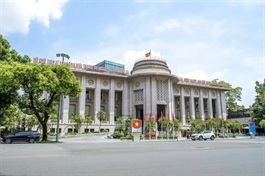Still no VAT hike proposal to aid business development
Still no VAT hike proposal to aid business development
The amended VAT Law is set to be submitted for approval next month with new content, yet the common tax rate is still proposed at 10 per cent to help businesses through current turbulent times.

The amended law statement notes that one of the guiding viewpoints in law development is to ensure compliance with international economic integration requirements and contemporary tax reform trends internationally.
The current VAT Law, which has not been updated since 2008, is deemed to have many limitations. Discussions at the National Assembly (NA) Standing Committee all articulated the need to amend the law, but agreed that many issues need to be studied more thoroughly.
Vu Hong Thanh, chairman of the NA Economic Committee, revealed that many domestic and foreign businesses have made recommendations about problems in the draft law.
"Businesses in export processing zones are very concerned about removing VAT exemption for services provided to non-tariff zones and narrowing the scope of export services to which the zero VAT rate applies," said Thanh. "If this regulation is applied, commodity prices will increase and the competitiveness of businesses will be reduced, affecting the appeal of the local investment environment."
Thanh believes that it is necessary to calculate the application of VAT on services between businesses producing export items and those providing these services in non-tariff zones, and measure the influences to avoid affecting local investment and business environment as well as dampening Vietnamese commodities’ competitiveness.
According to Vu Hai Ha, chairman of the NA Foreign Affairs Committee, the committee has received a number of recommendations from multinationals regarding tax imposition on export services.
"The investors are concerned about the narrower scope of export services in the draft law compared to general practice, especially in the context when regional peers are expanding the scope of zero per cent tax rate to so-called exported services," Ha said.
“We still don’t have regulations on consumers outside of Vietnam. Therefore, the application varies from localities to localities. The Drafting Committee and verification agency need to consider how the regulations on the above issue affect export business and the investment environment,” added Ha.
From a longer perspective on tax rates, the NA Standing Finance-Budget Committee said that Vietnam’s common tax rate of 10 per cent currently is lower than other countries in the region and beyond.
Specifically, the average VAT rate in Asia is 12 per cent, in Latin America 14 per cent, in Africa 16 per cent, and in EU member countries 22 per cent. The current global average tax rate is around 15 per cent.
The Finance-Budget Committee said that some countries, including ASEAN members, have been increasing their VAT rates as a solution to improve budget collection efficiency.
For instance, Indonesia increased its VAT rate from 10 to 11 per cent in April 2022, while Singapore increased it following a two-year roadmap, from 7 to 8 per cent in January 2023, and then to 9 per cent in January 2024.
The Finance-Budget Standing Committee requests the government to evaluate the impact of tax rate increase options following a roadmap so that it can consider the possibility of stipulating a tax rate increase roadmap in the VAT law appropriately, after the economy has recovered, possibly in the 2026-2030 period.
In the feedback, Minister of Finance Ho Duc Phoc stressed the mounting difficulties businesses are currently facing, saying that for the past three years, the VAT rate has been reduced to 8 per cent and in the rest of 2024, the government will seek to maintain this rate to help businesses weather headwinds.
“A common tax rate of 10 per cent is, therefore, appropriate,” said Phoc.




























